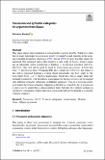Possession and syntactic categories: An argument from Äiwoo
Author(s)
Roversi, Giovanni
Download11049_2024_Article_9623.pdf (1.370Mb)
Publisher Policy
Publisher Policy
Article is made available in accordance with the publisher's policy and may be subject to US copyright law. Please refer to the publisher's site for terms of use.
Terms of use
Metadata
Show full item recordAbstract
This paper argues that possession is syntactically category-flexible. While it is clear that in many languages possession is mostly grounded in and operates in the nominal extended projection (Szabolcsi 1983; Kayne 1993), I show that this cannot be universal. The empirical part of this article is a case study of Äiwoo, which I argue has an inherently verbal counterpart of English ’s, an abstract transitive verb I label poss. This verb can be used by itself to form clausal possession: ‘I poss this boat’ ≈ ‘this boat is mine.’ Possessed DPs also contain the verb poss: the object of this verb is extracted, forming a relative clause. Informally, ‘my boat’ really is ‘the boati ’ ≈ ‘the boat that is mine.’ Given this, Äiwoo simply lacks true nominal possessives. The theoretical consequence is that possession can be mapped onto different syntactic categories in different languages. This is a welcome result, as it makes the syntax-semantics mapping as flexible as it needs to be: if possession is just a tool to assert that a certain relation holds between two entities, nothing in our theory of grammar predicts that such a notion should only be limited to a specific syntactic category.
Date issued
2024-10-18Department
Massachusetts Institute of Technology. Department of Linguistics and PhilosophyJournal
Natural Language & Linguistic Theory
Publisher
Springer Netherlands
Citation
Roversi, G. Possession and syntactic categories: An argument from Äiwoo. Nat Lang Linguist Theory (2024).
Version: Final published version